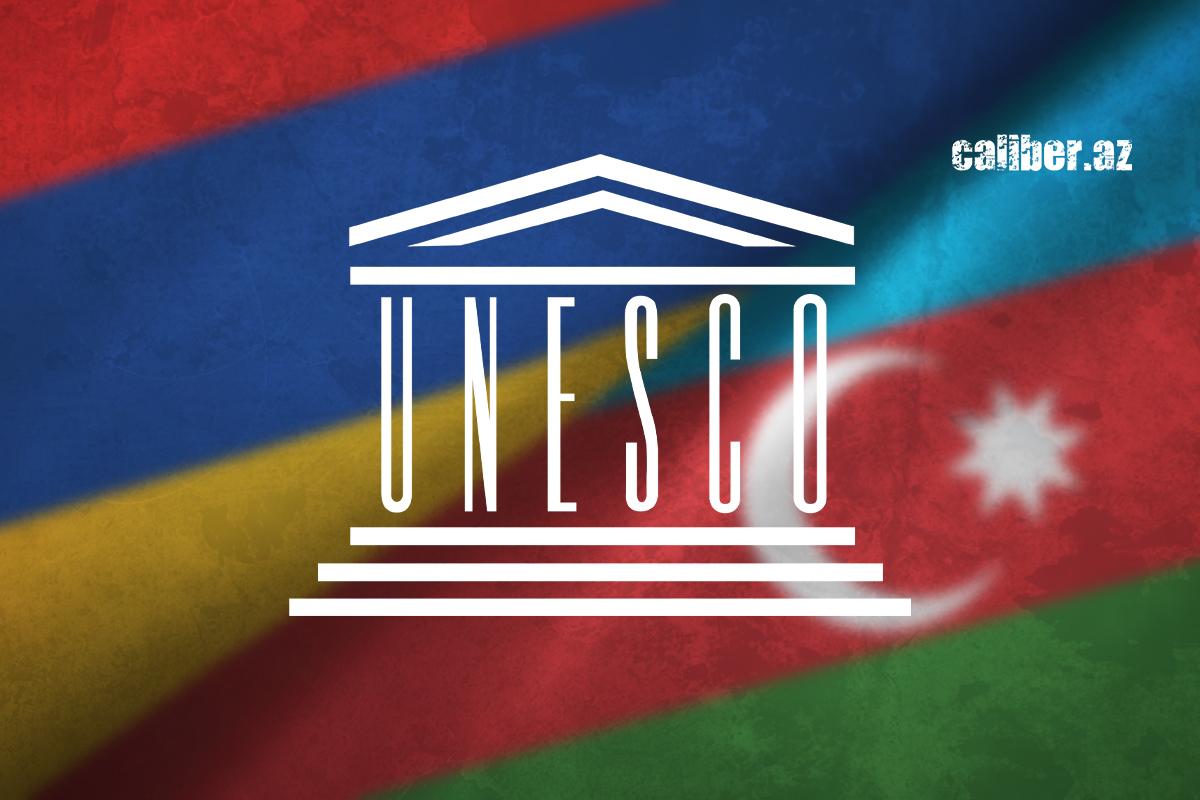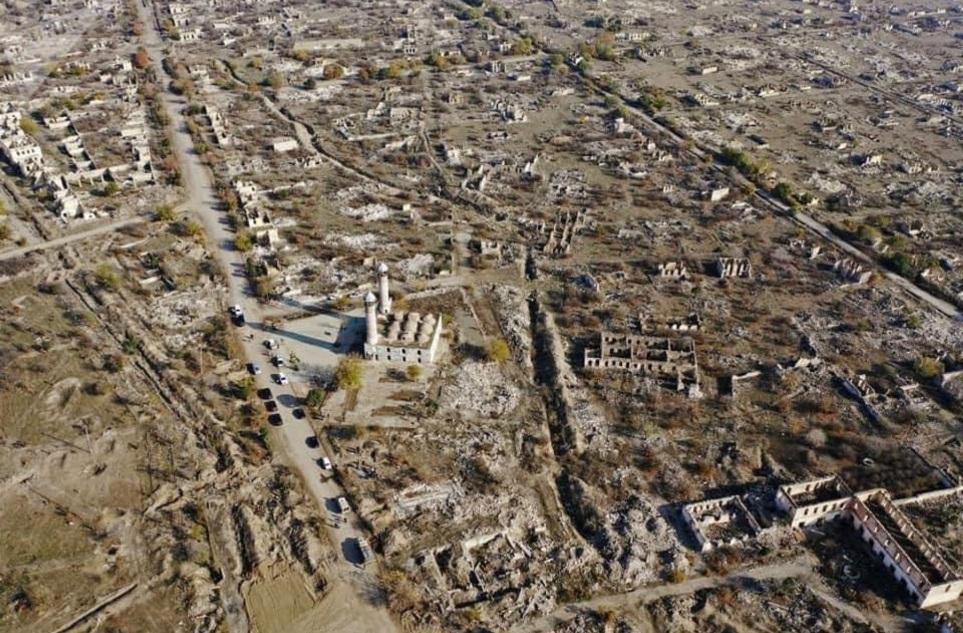Armenia and UNESCO: A duet of hypocrisy Some destroyed, others remained silent
Armenia continues to spread lies around the world, claiming that Azerbaijan is "deliberately destroying the cultural and historical heritage of Armenians in Karabakh." Meanwhile, in Yerevan, there is hope of gaining support from UNESCO. Recently, Vahan Kostanyan, the Armenian Deputy Foreign Minister, claimed at a conference held in conjunction with UNESCO at the Matenadaran that "the millennia-old Armenian heritage is facing the threat of destruction and distortion of identity by Azerbaijan."
In September, Armenia's Foreign Minister, Ararat Mirzoyan, made similar statements at the ministerial meeting of the Ancient Civilizations Forum in Yerevan. "The millennia-old Armenian cultural heritage in Nagorno-Karabakh is under imminent threat of elimination, following the ethnic cleansing of its entire indigenous Armenian population…It should be noted, that the deliberate and systematic destruction, desecration and appropriation of Armenian cultural and religious sites and artefacts represents a direct breach of the legally binding order of the International Court of Justice." Mirzoyan urged UNESCO to dispatch a mission of experts to Azerbaijan to assess the situation.
Based on the defamatory statements from the Armenian side, it is clear that Yerevan has not abandoned its territorial claims against Azerbaijan. The Armenian Foreign Minister's use of the term "Nagorno-Karabakh" indicates that Armenia only pays lip service to recognizing Azerbaijan's territorial integrity. As for Mirzoyan's absurd proposal to send a UNESCO mission, it should not be directed to Azerbaijan but rather to Armenia.
Baku rightfully expresses its dissatisfaction with UNESCO's failure to assess the systematic destruction of Azerbaijani cultural heritage, both in the territories liberated from Armenian occupation in Karabakh and within Armenia itself. Meanwhile, Armenian media reported that Krista Pikkat, the Director of the UNESCO Culture and Emergencies Entity and Secretary of the 1954 Hague Convention and its two protocols (1954 and 1999), has expressed concern over reports of "the alleged destruction of cultural values of various origins and types." She stated that "the UNESCO Director-General immediately wanted to dispatch a technical mission to the region to take stock of the situation and to understand the needs how UNESCO can help to preserve and protect the diverse heritage."
UNESCO, which failed to send a mission to Karabakh during the thirty years of Armenian occupation when Azerbaijani cultural and historical heritage was being destroyed, has only now shown an interest in sending a technical mission to the region. Furthermore, Baku called on UNESCO last November to send a mission to assess the state of Azerbaijani cultural heritage in Armenia. However, no concrete steps have been taken by UNESCO in this regard, further demonstrating the double standards applied to Azerbaijan.

In September of this year, representatives of Azerbaijani civil society sent an open letter to the leadership of the OSCE and the Council of Europe—current OSCE Chairperson Ian Borg and Council of Europe Secretary-General Alain Berset. The letter highlighted a systematic campaign in Armenia, where Azerbaijanis have historically resided, aimed at destroying their material and cultural heritage.
"This deliberate destruction has been ongoing for decades. We note with a heavy heart that today, only one out of 269 mosques registered on the territory of Armenia in 1870 has survived. In addition, hundreds of cemeteries belonging to Azerbaijanis have been systematically destroyed… Iravan, the current capital of the Republic of Armenia, was once divided into Shahar, Damirbulag, and Tapabashi districts…However, it is regrettable that Tapabashi neighbourhood, which is part of the Armenian government’s systematic campaign towards erasing the cultural heritage of the Azerbaijani people, is to be completely destroyed," the letter stated.
The appeal also underscored that Azerbaijani civil society representatives have yet to receive a response from UNESCO regarding their urgent request to prevent the destruction of the Tapabashi neighbourhood.
Armenia's systematic destruction of Azerbaijani cultural monuments grossly violates numerous international conventions, including the International Covenant on Economic, Social and Cultural Rights, the World Heritage Convention, the Convention for the Safeguarding of the Intangible Cultural Heritage, and the International Convention on the Elimination of All Forms of Racial Discrimination. This is surely known not only to UNESCO but also to the Council of Europe and the OSCE. Thus, it is not surprising that trust in these international organizations has eroded in Azerbaijan, especially as they choose to turn a blind eye to Armenian barbarism.
In this context, President Ilham Aliyev has pointed out that Armenia has carried out illegal actions in the formerly occupied territories, such as the deliberate destruction or Armenianization of cultural, historical, and religious monuments belonging to the Azerbaijani people. Notably, it has been documented that Armenia has destroyed 927 libraries, over 60 mosques, 44 churches, 473 historical monuments, palaces, and museums, and unlawfully removed 40,000 museum artefacts.
To curb Armenia's illegal activities, Azerbaijan has repeatedly proposed sending a UNESCO mission to the occupied territories; however, Armenia has consistently obstructed these efforts.
In Azerbaijan, several publications have been prepared that detail the cultural and historical genocide perpetrated by Armenia against Azerbaijani territories. For instance, in 2007, a book titled War Against Azerbaijan: An Attack on Cultural Heritage was compiled and submitted to UNESCO. This publication includes a list of cultural and religious monuments destroyed by Armenia in the occupied territories, as well as information on the intentional Armenianization of these sites, including the misrepresentation of Albanian churches as Armenian. Unsurprisingly, UNESCO did not respond to this matter.
In 2016, reports emerged about Armenia using the Aghdam Juma Mosque for military purposes, which constitutes a serious violation of international law, including the 1954 Hague Convention for the Protection of Cultural Property in the Event of Armed Conflict. Additionally, Armenia conducted illegal archaeological excavations in the Azikh Cave and Aghdam, unlawfully removing valuable artefacts. This action exemplifies a state-sponsored policy of vandalism and theft.

In November 2022, Mehriban Aliyeva, the First Vice-President of Azerbaijan, resigned from her position as UNESCO Goodwill Ambassador. She informed the organization's Director-General, former French Minister of Culture Audrey Azoulay, in a letter detailing Armenia's policies of vandalism against Azerbaijani cultural heritage and historical monuments during the nearly 30 years of occupation. In her letter, she expressed hope for the organization to soon send a UNESCO mission to the territories liberated from occupation to assess the damage inflicted on Azerbaijan's cultural heritage as a result of Armenia's actions.
In this context, it is also relevant to mention President Ilham Aliyev's address to participants of the international conference held in Baku on the theme " Embracing Diversity: Tackling Islamophobia in 2024." In his remarks, he expressed disappointment over the destruction of Azerbaijan's Islamic historical and cultural heritage in Armenia.
"Azerbaijan has raised this matter with UNESCO, calling for a technical mission to be sent to that country for assessing the conditions of our cultural and religious sites subjected to destruction in Armenia for years. Unfortunately, to this day, UNESCO is yet to respond to our request," the president said in his message.
The fact that leading UN institutions remain silent on the concrete evidence of Armenian aggression against Azerbaijan's historical heritage does not absolve Armenia of its responsibilities under international law. Sooner or later, Armenia will have to fully answer for the harm it has caused, regardless of the support it receives from organizations like UNESCO.








